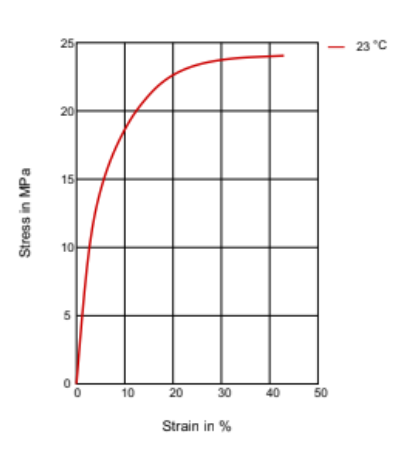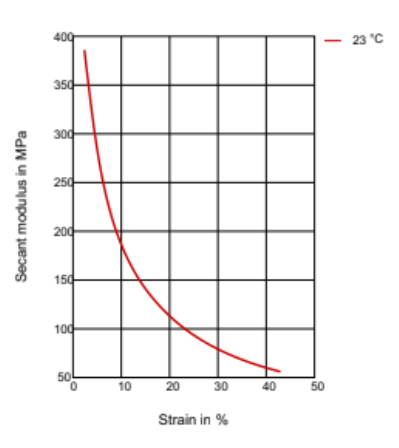Enhanced TDS
Identification & Functionality
- Additives Included
- Blend
- Yes
- Chemical Family
- Country of Origin
- Polymer Name
- Product Code
- MITM15030
- Single Ingredient
- No
- Technologies
- Product Families
Features & Benefits
- Labeling Claims
- Materials Features
Applications & Uses
- Plastics & Elastomers End Uses
- Plastics & Elastomers Processing Methods
- Processing Information
Injection Molding, Film Extrusion, Profile Extrusion, Other Extrusion, Transfer Molding, Casting, Thermoforming.
Properties
Technical Details & Test Data
- Technical Data
Stress-Strain Diagram:

Secant Modulus-Strain Diagram:

Processing Conditions:
- Typical melt temperature (Min / Recommended / Max): 230°C / 260°C / 290°C.
- Typical mold temperature: 25 - 60°C.
- Drying time and temperature (only necessary for bags opened for more than two hours): 5-7 hours at 70-80°C.
Processing Conditions:
- Typical melt temperature (Min / Recommended / Max): 220°C / 235°C / 250°C.
- Drying time and temperature (only necessary for bags opened for more than two hours): 5-7 hours at 70-80°C.
Packaging & Availability
- Packaging Type
Principal Information
- Group Principal Number
- S000003
- Principal
Other
- Color (SDS)
- Colorless to slightly yellow
- Item Number
- Other Hazards
- Processing may release vapors and/or fumes which cause eye, skin and respiratory tract irritation, Prolonged or repeated exposure may cause: headache, drowsiness, nausea, weakness, (severity of effects depends on extent of exposure).
- USA/DOT UN Number
- Not Applicable
- Shelf Life & Stability
Value Units Test Method / Conditions Shelf Life 2.0 yr yr - Mechanical Properties
Value Units Test Method / Conditions Charpy Impact Strength 15.0 kJ/m² kJ/m² ISO 179-1EA at -30°C, condensed, notched Hardness 62.0 Shore D Shore D Hardness 62.0 Shore A Shore A ISO 868 Nominal Strain at Break min. 50.0 % % ISO 527-2 at break, condensed, nominal Strain at Break min. 300.0 % % ISO 527-1 at break thermoplastic elastomer, dry Strain at Yield 42.0 % % ISO 527-2 condensed Stress 57.0 MPa MPa ISO 527-1 at 300% elongation, dry Stress at Yield 24.0 MPa MPa ISO 527-2 condensed, at yield Tensile Modulus 360.0 MPa MPa ISO 527-2 condensed - Physical Properties
Value Units Test Method / Conditions Density 1030.0 kg/m³ kg/m³ ISO 1183 condensed Density 1030.0 kg/m³ kg/m³ ISO 1183 dry basis Humidity Absorption 0.7 % % ISO 62 dry basis Melting Point 186.0 °C °C ISO 11357-1 at 10°C/min Mold Shrinkage 1.2 % % ISO 2577 normal, dry Mold Shrinkage 1.3 % % ISO 2577 parallel, dry Mold Shrinkage 1.2 % % ISO 294-4 normal, dry Mold Shrinkage 1.3 % % ISO 294-4 parallel, dry Softening Point 175.0 °C °C ISO 306 at 50°C/h, 50N, dry Water Absorption 1.0 % % ISO 62 dry basis - Material Composition
Value Units Test Method / Conditions Carbon Content 88.0 % % ASTM D6866 - SDS Physical and Chemical Properties
Value Units Test Method / Conditions Autoignition Temperature (SDS) 698.0-842.0 °F °F Bulk Density (SDS) 550.0-650.0 kg/m³ kg/m³ Decomposition Temperature (SDS) 572.0-662.0 °F °F Density (SDS) 1.03 g/cm³ g/cm³ Lower Explosion Limit (SDS) 88.0 % % at 85⁰C Melting Point (SDS) 367.0 °F °F Solubility In Water (SDS) max. 1.0 mg/L mg/L at 20°C
